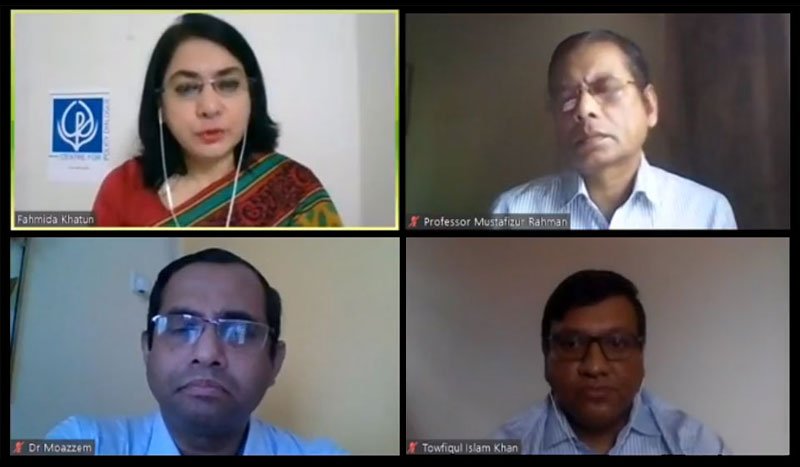
The vulnerable groups and marginalised communities are relatively more exposed to the threat of COVID-19 pandemic. Many of them do not get any social protection benefits. Daily wage earners and workers of informal sectors are critically suffering from the economic slowdown. In this context it is necessary to bring in a comprehensive stimulus package, particularly for vulnerable households.
https://www.facebook.com/cpd.org.bd/videos/309926793309251/
The Centre for Policy Dialogue (CPD) proposes Taka 30,000 crore direct cash transfer for 1.9 crore households as financial support. This will be about 1 per cent of the GDP. This can be done by providing with Tk. 8,000 per month for two months to each household, close to the lower poverty line, for a family of 4 members in today’s current prices.
CPD shared this proposal through a virtual media briefing on “COVID-19: CPD’s Initial Assessment of Public Policy Interventions and Proposals for Food and Income Security of the Marginalised” on 13 April 2020. This media briefing was organised under CPD’s flagship programme Independent Review of Bangladesh’s Development (IRBD). Mr Towfiqul Islam Khan, Senior Research Fellow, CPD, made the keynote presentation at the media briefing on behalf of the IRBD research team.
https://www.facebook.com/cpd.org.bd/videos/1372679276262987/
Mr Khan noted in his presentation that lack of good governance has been undermining the government’s various initiatives to support the citizens during this national crisis. An in-built technology induced mechanism can be put in place to implement the proposed cash transfer programme. It will help the government to reduce leakages and avoid selection bias and control corruption, suggested Mr Khan.
The lists of people in need which are being prepared by the local administration and local government machineries will be helpful. This proposed programme should have an in-built mechanism where the vulnerable citizens can apply for inclusion. Hot-line numbers need to be designated where citizens can call and apply for inclusion in the programme. The ‘local rapid action committee’ will need to be set up involving local administration, local government representatives, local police and appropriate number of NGO representatives and volunteer organisations (including community-based organisations) working in that particular region who will approve these applications within 24 hours. Besides, for a transparent implementation of the incentive programmes the list of beneficiaries should be disclosed though government websites which can be facilitated by Access to Information (A2I), the CPD paper emphasised.
The event began with introductory remarks by Dr Fahmida Khatun, Executive Director, CPD. She noted that ensuring transparency is a must for effectiveness of the incentive programmes announced so far. She urged the government to come up with concrete allocation for the vulnerable groups so that they can survived during the COVID-19 crisis. Professor Mustafizur Rahman, Distinguished Fellow and Dr Khondaker Golam Moazzem, Research Director, CPD were also present at the event and shared their views through responding to questions from the media.


